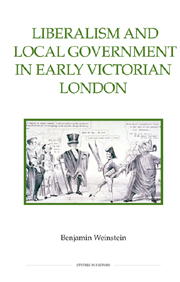Book contents
- Frontmatter
- Contents
- Acknowledgements
- Abbreviations
- Introduction
- 1 Liberal attachments to the unreformed metropolis
- 2 The ‘radicalisation’ of metropolitan political culture, 1832–1841
- 3 The polarisation of metropolitan political culture, 1842–1855
- 4 Redefining the state, I: Rates and taxes, 1834–1853
- 5 Redefining the state, II: The London government problem
- 6 Marylebone in 1854: from conflict to compromise
- Conclusion
- Bibliography
- Index
Introduction
Published online by Cambridge University Press: 12 September 2012
- Frontmatter
- Contents
- Acknowledgements
- Abbreviations
- Introduction
- 1 Liberal attachments to the unreformed metropolis
- 2 The ‘radicalisation’ of metropolitan political culture, 1832–1841
- 3 The polarisation of metropolitan political culture, 1842–1855
- 4 Redefining the state, I: Rates and taxes, 1834–1853
- 5 Redefining the state, II: The London government problem
- 6 Marylebone in 1854: from conflict to compromise
- Conclusion
- Bibliography
- Index
Summary
This book considers the development of London's liberal political culture between the general election of 1832 and the establishment of the Metropolitan Board of Works in 1855. Such an undertaking is badly needed. While excellent work has been produced on London's Regency, mid-Victorian and late Victorian political culture, accounts of the early Victorian period are relatively scarce. Moreover, much of what has been produced focuses quite narrowly on the sociology of early Victorian ‘popular radicalism’. David Goodway's analysis of London Chartism and Geoffrey Crossick's study of politicised artisans in Kentish Town are representative of this approach, which seems to have grown out of D. J. Rowe's earlier engagements with London's early Victorian radical political culture. Although William Thomas's Philosophic radicals pays greater attention to the impact of ideas, it is only incidentally about London, and in fact many of its various ‘character studies’ can be abstracted from the metropolitan context altogether. The same can be said of Miles Taylor's Decline of British radicalism, which contains many insights into the metropolitan political culture, but which, given the book's scope, never lingers on London for long.
Liberalism and local government proposes a fresh interpretation of London's early Victorian political culture. It does this by devoting particular attention to the relationship which existed within London between Russellite Whigs on the one hand, and vestry-based radicals on the other. In considering this relationship, this study argues that Whiggery – a political creed heretofore thought out of place and out of favour in large urban settings – was an espe-cially potent force within early Victorian London.
- Type
- Chapter
- Information
- Publisher: Boydell & BrewerPrint publication year: 2011

